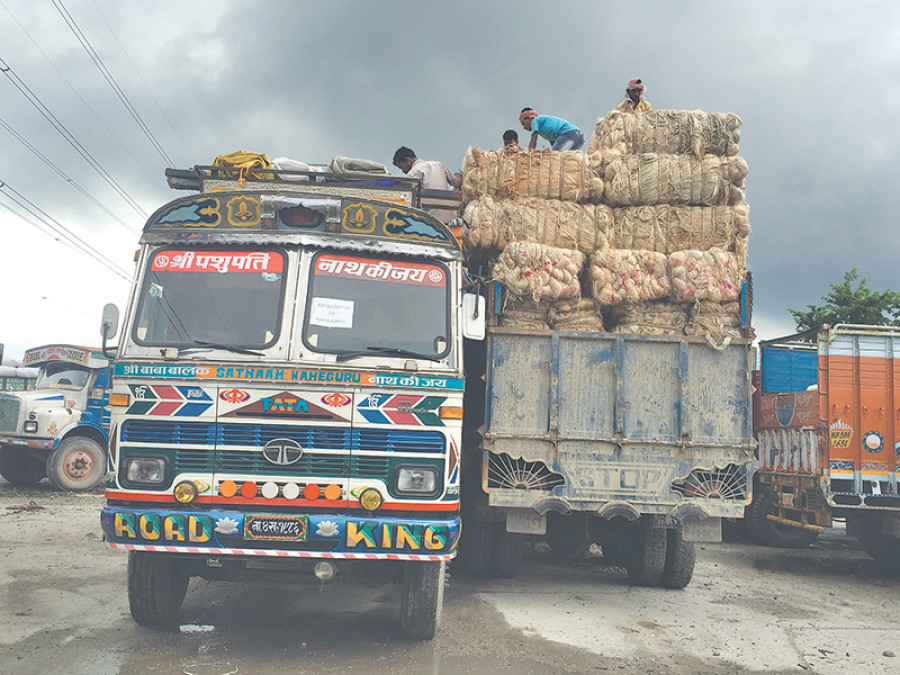Money
Traders urge improvement of Nepal-Bangladesh customs process
Nepali traders in the eastern region have expressed dismay over unnecessary customs charges and documentation hassles while trading goods to Bangladesh.
Deo Narayan Sah
Nepali traders in the eastern region have expressed dismay over unnecessary customs charges and documentation hassles while trading goods to Bangladesh.
They have drawn the attention of the government to resolve the issue in order to boost Nepal-Bangladesh bilateral trade. They were speaking at an interaction entitled Nepal-Bangladesh Trade: Opportunities and Challenges, organised by Nepal-India Regional Trade and Transport Project under the Ministry of Industry, Commerce and Supplies.
The project aims to considerably reduce the transport time and logistical costs for bilateral trade between Nepal and India and transit trade along the Kathmandu-Kolkata corridor.
Yadav Poudel, president at Nepal-Bangladesh Chamber of Traders, in Dhulabari, Jhapa complained that Bangladesh has been charging high customs tariff on Nepali goods and demanding unnecessary documents.
Yadav said that last year when they exported ginger with a valuation of $220 per tonne, Bangladesh customs inflated the valuation of the ginger to $900 per tonne and charged the customs tariff accordingly.
Sunil Tibdewal, a carpet manufacturer, requested the government to include carpets in the list of exports as Bangladesh has been importing a huge amount of carpets from other countries annually.
Pradeep Sharda, one of the key exporters to Bangladesh, charged that the government has been imposing export tax from Nepali traders which has been discouraging domestic producers. The government has been charging 1 percent export fee on lentil and 50 paisa on flour exports.
One of the issues raised by Nepali traders was the “advance payment” service in Nepal-Bangladesh trade. Sharda said that Nepali traders can make advance payment through Nepal Rastra Bank, but Bangladesh doesn’t accept the service.
Pannalal Jain, founder and president at the Nepal Bangladesh Chamber of Traders, said they were required to submit 78 types of documents in order to export goods to Bangladesh which consumes a lot of time. “Procedures while importing goods from Bangladesh has eased, but exporting has become more difficult,” he said, adding that the government should consider the issue seriously.
Jain said that custom clearance while importing goods from Bangladesh is done promptly, but for Nepali exporters, they have to wait a minimum of two days to complete the customs formalities. “As most of the goods exported to Bangladesh are perishable, the lengthy process has been putting Nepali traders in a difficult position.” Nepal-Bangladesh trade relation has completed 22 years. “And still, Nepal is exporting lentils and flour only,” said Bhim Ghimire, president at Industry Association Morang.
Goods and products such as broom grass, spices, cabbage, tomato, kiwi, avocado, orange, lentil, pickles, snacks, carpet and dairy product could be exported to Bangladesh due to its increasing demand, he said. The government should negotiate for the export of goods that carries potential in Bangladesh.
“The government should accord priority for domestic production to minimise the ballooning trade deficit,” said Ghimire.
Similarly, Pawan Sharada, president at Morang Merchant Association, said that agricultural products, plastics goods, food items and herbs have huge export potential in Bangladesh.
“The eastern region can be a key gateway for Bangladeshi tourists,” he said, adding that the government should consider this potential and make proper management to facilitate transit between the two countries. Jain said that flight connectivity can be established with Bangladesh from Biratnagar. There are bus service options as well.
Trade expert Posh Raj Pandey said that the country exported goods worth Rs10.83 billion to Bangladesh, while imports stood at Rs12.44 billion in the fiscal year. “Beside customs charges, there are other fees which have caused difficulties in increasing exports of Nepali goods to Bangladesh,” he said.
Rabi Shankar Sainju, joint secretary at Ministry of Industry, Commerce and Supplies, said that the government is reviewing the trade treaty with a number of South Asian countries and they have started holding discussions with Nepali traders and entrepreneurs to identify problems in the bilateral trade.
Jagadish Prasad Kusihyat, Minister for Industry, Tourism, Forest and Environment of Province 1 said that talks would be initiated to begin Dhaka-Kathmandu bus service, in order to promote tourism between the two countries.




 9.83°C Kathmandu
9.83°C Kathmandu-(1).jpg)















